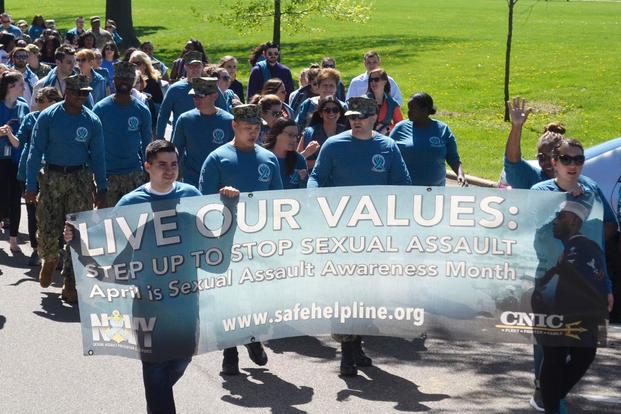Gay, lesbian and bisexual service members may be significantly more likely to suffer sexual assaults in the military than heterosexual troops, a new Rand Corp. study has found.
In order to stop the assaults, Rand said in the study released Tuesday, the military must do more to understand why they are taking place and determine whether they are hate crimes.
Rand said about 43% of all military sexual assaults over the prior year were committed against troops who are gay, lesbian and bisexual, or who otherwise did not indicate they are heterosexual, although they make up about 12% of the active-duty force, according to a 2018 Defense Department survey.
Read Next: Retired Navy Lieutenant Commander Accused of Breaching US Capitol Appears in Court
Despite that alarming difference in rates, Rand said, the military has done little to focus on sexual assaults against LGB service members in its prevention materials, research or public discussions about sexual assault in the military.
Defense researchers in 2018 found that an estimated 9% of lesbian or bisexual women in the military had been sexually assaulted at least once in the prior year, according to the study. That's about twice the 4.8% of women who reported being heterosexual or otherwise non-LGB estimated to have experienced one or more sexual assaults during that time frame.
The difference between sexual assault rates for gay or bisexual men, as opposed to heterosexual men, was even more stark, Rand said. The DoD estimated that 0.4% of heterosexual or other non-LGB men had been sexually assaulted over the previous year, but an estimated 3.7% of gay or bisexual men -- nine times the rate of LGB men -- had been sexually assaulted.
The data collected in the Pentagon's 2018 Workplace and Gender Relations Survey of Active Duty Members suggests that there may be about 43,000 gay or bisexual men and about 29,000 lesbian or bisexual women in the active-duty military, out of nearly 1.3 million active-duty troops.
The 2018 survey found that 4% of servicemen, and 14% of servicewomen, identified as gay, lesbian or bisexual. The report also found that 91% of men and 77% of women in the military identified as heterosexual. Another 6% of men and 9% of women selected "other," including questioning, asexual or undecided, or said they preferred not to answer.
The report did not break out sexual assault rates for the troops who identified as “other” or preferred not to answer.
With so many gay, lesbian or bisexual troops in uniform, and such a disproportionate percentage of that population experiencing sexual assaults, Rand said the data suggests that "a considerable fraction" of sexual assaults are likely being committed against LGB service members.
To try to prevent assaults on gay, lesbian and bisexual troops, Rand said the military needs to do more to understand where they are occurring and what is motivating the attackers. The researchers said it would be particularly important to learn whether the assaults are mainly hate crimes or harassment based on the victims' sexual orientation, as opposed to being sexually motivated assaults.
Many military sexual assaults take place during hazing incidents, according to the study. In other cases, the attackers might be acting out of their dislike for sexual minorities and want to humiliate or debase the victims, Rand said.
Threats, intimidation, vandalism to personal property, and other forms of physical assault are some of the other ways LGB troops have reported being harassed, the study adds.
-- Stephen Losey can be reached at stephen.losey@military.com. Follow him on Twitter @StephenLosey.
Related: Military Leaders Wary of Changes in Sexual Assault Policy












